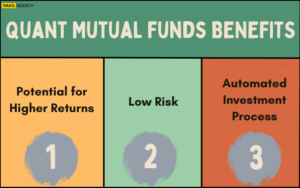Quant Mutual Fund, also known as quantitative funds, are a type of investment fund that uses mathematical models and algorithms to make investment decisions. In this blog, we will discuss what quant mutual funds are, how they work, and the benefits and risks associated with them.
Table of Contents
What are Quant Mutual Funds?
Quant mutual funds are a type of mutual fund that uses quantitative analysis to make investment decisions. Quantitative analysis is a systematic approach to investing that uses mathematical models and algorithms to analyze vast amounts of data to identify investment opportunities.
The investment process involves the use of computer programs and mathematical models to analyze market data and make predictions about future market trends. This information is then used to make investment decisions, such as buying or selling stocks, bonds, or other financial instruments.
They are one of the latest trends in the investment industry and are gaining popularity among investors due to their potential for higher returns and low risk.
How do Quant Mutual Funds Work?
Quant mutual funds use mathematical models and algorithms to analyze market data and identify investment opportunities. The models and algorithms used by quant funds are based on a variety of factors, including historical market trends, economic data, and financial metrics.
Benefits of Quant Mutual Funds

Potential for Higher Returns
Quant mutual funds have the potential to generate higher returns compared to traditional mutual funds. This is because the quantitative models used by quant funds are designed to identify undervalued securities and to predict market trends. By doing so, quant funds can take advantage of market opportunities and generate higher returns for their investors.
Low Risk
Quant mutual funds are considered to be low-risk compared to other types of investment funds. This is because the quantitative models used by quant funds are designed to minimize risk by diversifying investments and adjusting portfolios as market conditions change.
Automated Investment Process
The investment process in quant mutual funds is automated, which means that decisions are made based on mathematical models and algorithms rather than subjective judgment. This can lead to more consistent and reliable investment results.
Risks of Quant Mutual Funds
Dependence on Models: Quant mutual funds are dependent on the accuracy of their mathematical models and algorithms. If the models are not accurate, the investment decisions made by the fund manager may not generate the desired results. (buy modafinil uk 100mg)
Limited Market Understanding: Quant mutual funds rely heavily on market data and historical trends to make investment decisions. However, this may not always be a reliable indicator of future market trends, which can lead to poor investment performance.
Lack of Human Judgment: The investment process in quant mutual funds is automated, which means that human judgment is not involved. This can be seen as a disadvantage because human judgment can sometimes provide a different perspective on market conditions and investment opportunities.
What are the Requirements of Quant Mutual Fund?
The requirements for investing in a quantitative mutual fund can vary depending on the specific fund and the investment firm managing it. However, there are some general requirements that are common among most quant funds.
- Most quant mutual funds have a minimum investment requirement that can range from a few thousand dollars to several hundred thousand dollars. This requirement is put in place to ensure that the fund has a sufficient pool of capital to invest in a diversified portfolio of securities.
- Some quant mutual funds may require that investors meet certain accreditation requirements, such as having a high net worth or being an institutional investor. This requirement is put in place to ensure that the fund is only invested in by sophisticated investors who understand the risks associated with investing in a quant fund.
- Some quant mutual funds may also require that investors have a certain level of investment experience and knowledge. This requirement is put in place to ensure that the investors are able to understand the investment process and the risks associated with the fund.
- In order to invest in a quant mutual fund, investors may need to provide documentation, such as proof of identity, proof of income, and tax documentation. This documentation is required to comply with regulatory requirements and to ensure that the investor is eligible to invest in the fund.
Conclusion
In conclusion, quant mutual funds are a type of investment fund that uses mathematical models and algorithms to make investment decisions.
They offer the potential for higher returns and low risk, but also carry some risks, such as dependence on models and a lack of human judgment. As with any investment, it is important to do your research and to understand the risks and benefits before investing in a quant mutual fund. Further, you can reach out to our experts in Vakilsearch to get legal assistance for various investment plans.
Read more,



